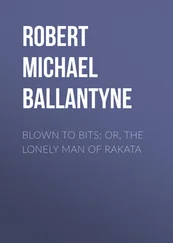Robert Michael Ballantyne - Blown to Bits - The Lonely Man of Rakata, the Malay Archipelago
Здесь есть возможность читать онлайн «Robert Michael Ballantyne - Blown to Bits - The Lonely Man of Rakata, the Malay Archipelago» — ознакомительный отрывок электронной книги совершенно бесплатно, а после прочтения отрывка купить полную версию. В некоторых случаях можно слушать аудио, скачать через торрент в формате fb2 и присутствует краткое содержание. Жанр: foreign_children, literature_19, foreign_antique, foreign_prose, на английском языке. Описание произведения, (предисловие) а так же отзывы посетителей доступны на портале библиотеки ЛибКат.
- Название:Blown to Bits: The Lonely Man of Rakata, the Malay Archipelago
- Автор:
- Жанр:
- Год:неизвестен
- ISBN:нет данных
- Рейтинг книги:5 / 5. Голосов: 1
-
Избранное:Добавить в избранное
- Отзывы:
-
Ваша оценка:
- 100
- 1
- 2
- 3
- 4
- 5
Blown to Bits: The Lonely Man of Rakata, the Malay Archipelago: краткое содержание, описание и аннотация
Предлагаем к чтению аннотацию, описание, краткое содержание или предисловие (зависит от того, что написал сам автор книги «Blown to Bits: The Lonely Man of Rakata, the Malay Archipelago»). Если вы не нашли необходимую информацию о книге — напишите в комментариях, мы постараемся отыскать её.
Blown to Bits: The Lonely Man of Rakata, the Malay Archipelago — читать онлайн ознакомительный отрывок
Ниже представлен текст книги, разбитый по страницам. Система сохранения места последней прочитанной страницы, позволяет с удобством читать онлайн бесплатно книгу «Blown to Bits: The Lonely Man of Rakata, the Malay Archipelago», без необходимости каждый раз заново искать на чём Вы остановились. Поставьте закладку, и сможете в любой момент перейти на страницу, на которой закончили чтение.
Интервал:
Закладка:
R. M. Ballantyne
Blown to Bits: The Lonely Man of Rakata, the Malay Archipelago
Chapter One
The Play Commences
Blown to bits; bits so inconceivably, so ineffably, so “microscopically” small that—but let us not anticipate.
About the darkest hour of a very dark night, in the year 1883, a large brig lay becalmed on the Indian Ocean, not far from that region of the Eastern world which is associated in some minds with spices, volcanoes, coffee, and piratical junks, namely, the Malay Archipelago.
Two men slowly paced the brig’s quarterdeck for some time in silence, as if the elemental quietude which prevailed above and below had infected them. Both men were broad, and apparently strong. One of them was tall; the other short. More than this the feeble light of the binnacle-lamp failed to reveal.
“Father,” said the tall man to the short one, “I do like to hear the gentle pattering of the reef-points on the sails; it is so suggestive of peace and rest. Doesn’t it strike you so?”
“Can’t say it does, lad,” replied the short man, in a voice which, naturally mellow and hearty, had been rendered nautically harsh and gruff by years of persistent roaring in the teeth of wind and weather. “More suggestive to me of lost time and lee-way.”
The son laughed lightly, a pleasant, kindly, soft laugh, in keeping with the scene and hour.
“Why, father,” he resumed after a brief pause, “you are so sternly practical that you drive all the sentiment out of a fellow. I had almost risen to the regions of poetry just now, under the pleasant influences of nature.”
“Glad I got hold of ’ee, lad, before you rose,” growled the captain of the brig—for such the short man was. “When a young fellow like you gets up into the clouds o’ poetry, he’s like a man in a balloon—scarce knows how he got there; doesn’t know very well how he’s to get down, an’ has no more idea where he’s goin’ to, or what he’s drivin’ at, than the man in the moon. Take my advice, lad, an’ get out o’ poetical regions as fast as ye can. It don’t suit a young fellow who has got to do duty as first mate of his father’s brig and push his way in the world as a seaman. When I sent you to school an’ made you a far better scholar than myself, I had no notion they was goin’ to teach you poetry.”
The captain delivered the last word with an emphasis which was meant to convey the idea of profound but not ill-natured scorn.
“Why, father,” returned the young man, in a tone which plainly told of a gleeful laugh within him, which was as yet restrained, “it was not school that put poetry into me—if indeed there be any in me at all.”
“What was it, then?”
“It was mother,” returned the youth, promptly, “and surely you don’t object to poetry in her .”
“Object!” cried the captain, as though speaking in the teeth of a Nor’wester. “Of course not. But then, Nigel, poetry in your mother is poetry, an’ she can do it, lad—screeds of it—equal to anything that Dibdin, or, or,—that other fellow, you know, I forget his name—ever put pen to—why, your mother is herself a poem! neatly made up, rounded off at the corners, French-polished and all shipshape. Ha! you needn’t go an’ shelter yourself under her wings, wi’ your inflated, up in the clouds, reef-point patterin’, balloon-like nonsense.”
“Well, well, father, don’t get so hot about it; I won’t offend again. Besides, I’m quite content to take a very low place so long as you give mother her right position. We won’t disagree about that, but I suspect that we differ considerably about the other matter you mentioned.”
“What other matter?” demanded the sire.
“My doing duty as first mate,” answered the son. “It must be quite evident to you by this time, I should think, that I am not cut out for a sailor. After all your trouble, and my own efforts during this long voyage round the Cape, I’m no better than an amateur. I told you that a youth taken fresh from college, without any previous experience of the sea except in boats, could not be licked into shape in so short a time. It is absurd to call me first mate of the Sunshine . That is in reality Mr Moor’s position—”
“No, it isn’t, Nigel, my son,” interrupted the captain, firmly. “Mr Moor is second mate. I say so, an’ if I, the skipper and owner o’ this brig, don’t know it, I’d like to know who does! Now, look here, lad. You’ve always had a bad habit of underratin’ yourself an’ contradictin’ your father. I’m an old salt, you know, an’ I tell ’ee that for the time you’ve bin at sea, an’ the opportunities you’ve had, you’re a sort o’ walkin’ miracle. You’re no more an ammytoor than I am, and another voyage or two will make you quite fit to work your way all over the ocean, an’ finally to take command o’ this here brig, an’ let your old father stay at home wi’—wi’—”
“With the Poetess,” suggested Nigel.
“Just so—wi’ the equal o’ Dibdin, not to mention the other fellow. Now it seems to me—. How’s ’er head?”
The captain suddenly changed the subject here.
Nigel, who chanced to be standing next the binnacle, stooped to examine the compass, and the flood of light from its lamp revealed a smooth but manly and handsome face which seemed quite to harmonise with the cheery voice that belonged to it.
“Nor’-east-and-by-east,” he said.
“Are ’ee sure, lad?”
“Your doubting me, father, does not correspond with your lately expressed opinion of my seamanship; does it?”
“Let me see,” returned the captain, taking no notice of the remark, and stooping to look at the compass with a critical eye.
The flood of light, in this case, revealed a visage in which good-nature had evidently struggled for years against the virulent opposition of wind and weather, and had come off victorious, though not without evidences of the conflict. At the same time it revealed features similar to those of the son, though somewhat rugged and red, besides being smothered in hair.
“Vulcan must be concoctin’ a new brew,” he muttered, as he gazed inquiringly over the bow, “or he’s stirring up an old one.”
“What d’you mean, father?”
“I mean that there’s somethin’ goin’ on there-away—in the neighbourhood o’ Sunda Straits,” answered the Captain, directing attention to that point of the compass towards which the ship’s head was turned. “Darkness like this don’t happen without a cause. I’ve had some experience o’ them seas before now, an’ depend upon it that Vulcan is stirring up some o’ the fires that are always blazin’ away, more or less, around the Straits Settlements.”
“By which you mean, I suppose, that one of the numerous volcanoes in the Malay Archipelago has become active,” said Nigel; “but are we not some five or six hundred miles to the sou’-west of Sunda? Surely the influence of volcanic action could scarcely reach so far.”
“So far!” repeated the captain, with a sort of humph which was meant to indicate mild contempt; “that shows how little you know, with all your book-learnin’, about volcanoes.”
“I don’t profess to know much, father,” retorted Nigel in a tone of cheery defiance.
“Why, boy,” continued the other, resuming his perambulation of the deck, “explosions have sometimes been heard for hundreds, ay hundreds , of miles. I thought I heard one just now, but no doubt the unusual darkness works up my imagination and makes me suspicious, for it’s wonderful what fools the imag—. Hallo! D’ee feel that ?”
He went smartly towards the binnacle-light, as he spoke, and, holding an arm close to it, found that his sleeve was sprinkled with a thin coating of fine dust.
Читать дальшеИнтервал:
Закладка:
Похожие книги на «Blown to Bits: The Lonely Man of Rakata, the Malay Archipelago»
Представляем Вашему вниманию похожие книги на «Blown to Bits: The Lonely Man of Rakata, the Malay Archipelago» списком для выбора. Мы отобрали схожую по названию и смыслу литературу в надежде предоставить читателям больше вариантов отыскать новые, интересные, ещё непрочитанные произведения.
Обсуждение, отзывы о книге «Blown to Bits: The Lonely Man of Rakata, the Malay Archipelago» и просто собственные мнения читателей. Оставьте ваши комментарии, напишите, что Вы думаете о произведении, его смысле или главных героях. Укажите что конкретно понравилось, а что нет, и почему Вы так считаете.












